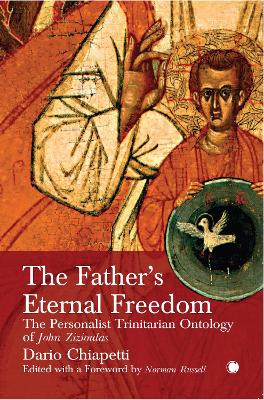John Zizioulas is renowned for his controversial reflection on the
ontological freedom as the cause and cipher of God's being, which also has
important implications for anthropology, ecclesiology and ecumenical dialogue.
This view is bound up with a personalist conception of the Trinity, recognised
in the teaching of the Greek Church Fathers, in which the person represents
the primary ontological category. In particular, Zizioulas shows how, by virtue
of the Father, personhood coincides with absolute freedom.
In The Father's Eternal Freedom, Dario Chiapetti explores this
ontology. Taking into account Zizioulas' epistemological principles, his
patristic reading and...Read more
John Zizioulas is renowned for his controversial reflection on the
ontological freedom as the cause and cipher of God's being, which also has
important implications for anthropology, ecclesiology and ecumenical dialogue.
This view is bound up with a personalist conception of the Trinity, recognised
in the teaching of the Greek Church Fathers, in which the person represents
the primary ontological category. In particular, Zizioulas shows how, by virtue
of the Father, personhood coincides with absolute freedom.
In The Father's Eternal Freedom, Dario Chiapetti explores this
ontology. Taking into account Zizioulas' epistemological principles, his
patristic reading and his theological development, the author systematically
presents Zizioulas' thesis, verifying its conformity to dogma and its internal
coherence. Chiapetti analyses how Zizioulas' proposal brings back to the centre
of systematic theology the teaching of the Greek Fathers, especially the
Cappadocians, and the apophatic horizon of dogmatic reflection. Such reflection
pushes the discourse on God to its maximum degree, identifying and bringing
out, rather than resolving or attenuating, the aporetic terms that structure
it.
ontological freedom as the cause and cipher of God's being, which also has
important implications for anthropology, ecclesiology and ecumenical dialogue.
This view is bound up with a personalist conception of the Trinity, recognised
in the teaching of the Greek Church Fathers, in which the person represents
the primary ontological category. In particular, Zizioulas shows how, by virtue
of the Father, personhood coincides with absolute freedom.
In The Father's Eternal Freedom, Dario Chiapetti explores this
ontology. Taking into account Zizioulas' epistemological principles, his
patristic reading and his theological development, the author systematically
presents Zizioulas' thesis, verifying its conformity to dogma and its internal
coherence. Chiapetti analyses how Zizioulas' proposal brings back to the centre
of systematic theology the teaching of the Greek Fathers, especially the
Cappadocians, and the apophatic horizon of dogmatic reflection. Such reflection
pushes the discourse on God to its maximum degree, identifying and bringing
out, rather than resolving or attenuating, the aporetic terms that structure
it.
- ISBN10 0227177754
- ISBN13 9780227177754
- Publish Date 30 June 2022
- Publish Status Forthcoming
- Publish Country GB
- Imprint James Clarke & Co Ltd
- Format eBook (EPUB)
- Language English
